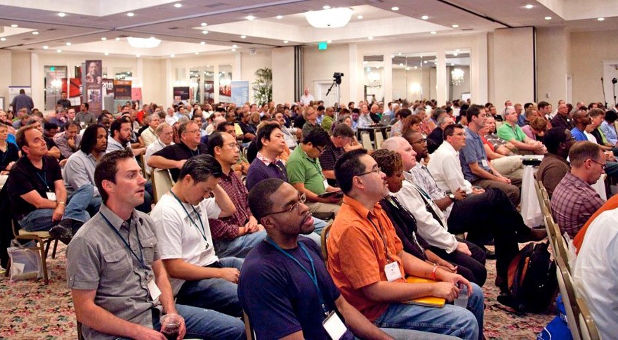Research: Racial Diversity at Church More Dream Than Reality
Having a racially diverse church remains more dream than reality for most Protestant pastors. More than eight in 10 (85 percent) say every church should strive for racial diversity, according to a survey from Nashville-based LifeWay Research.
But few have diverse flocks.
Most (86 percent) say their congregation is predominately one racial or ethnic group.
It’s a reality that once led the Rev. Martin Luther King Jr., to call Sunday mornings the most segregated time of the week.
Today, diverse churches remain rare, said Ed Stetzer, president of LifeWay Research, partly because of human nature.
“Everybody wants diversity,” said Stetzer. “But many don’t want to be around people who are different.”
The research study also found 91 percent say “churches should reflect the racial diversity in their community,” and 79 percent believe their congregations look very similar to the people in their neighborhood.
But Mark DeYmaz, pastor of Mosiac Church, a multiethnic church in Little Rock, Ark., is skeptical.
DeYmaz, who also helped found the Mosaix network of multiethnic churches, said pastors aren’t always aware of how diverse their communities have become.
“Pastors would do well to look into the diversity of nearby public schools and gauge this against the diversity of their church to really understand their context,” he said. “They might, too, spend one hour sitting at the front of the nearby Wal-Mart or other local grocery to see if in fact their church reflects the community.”
Data from the U.S. Census Bureau shows America is becoming increasingly diverse.
About 17 percent of Americans identify as Hispanic. African-Americans make up 13 percent of the population, followed by Asian Americans (5 percent), and one percent Native American or Native Alaskan. Another 2.4 percent identify with more than one racial group.
Non-Hispanic whites make up 63 percent of the population. That number drops to about 49 percent for children under 5 years old, according to a recent report from the Associated Press.
DeYmaz sees the widespread support for the idea of diversity in the LifeWay Research poll as a good sign.
“We have gained tremendous ground over the past 10 years or so,” said DeYmaz.
Ten years ago, he said, the first meeting of the Mosaix network drew about 30 people. A similar meeting in November drew more than 1,000.
He said pastors are more aware of the need for diversity in churches. In the past, DeYmaz and other leaders in multiethnic churches spent much of their time trying to convince other pastors about the need for diversity. Now they spend more time talking with pastors about strategies for creating diverse churches.
“Increasingly, their question is not, ‘why should I,’ but ‘how can I?’” he said.
Derwin Gray, pastor of Transformation Church, a multiethic congregation in Indian Land, S.C., said if pastors want a diverse congregation, they need to change their sermons.
He worries pastors support diversity for pragmatic rather than theological reasons.
Gray said the early Christian churches were racially diverse, but that idea was lost as churches divided along racial and ethnic lines.
He wants pastors to go back to the Bible to discover why churches should be diverse.
“We shouldn’t long for racial diversity—we should long for the proclamation of Jesus, which creates ethnic diversity,” he said. “The apostle Paul didn’t start one church for Jews and one church for Gentiles in the New Testament. The gospel brought people together.”
More focus on racial diversity in church could find a welcome audience.
A second LifeWay Research survey—this time an online panel of 1,036 Americans—found that three quarters (78 percent) say “every church should strive for racial diversity.”
More than half (51 percent) say they would be most comfortable visiting a church where multiple ethnicities are well represented. Three quarters (73 percent) also said churches should reflect the diversity of their communities.
There are some signs the number of diverse churches in the United States is growing.
The 2010 Faith Communities Today survey, which included 11,000 congregations of different faiths, found that about 12.5 percent of Protestant churches were multiethnic. That means in those churches no one ethnic group makes up more 80 percent of the congregation.
DeYmaz said moving diversity from a dream to a reality will take hard work.
“Wishful thinking in this regard will not bring increasing diversity to local churches for the sake of the gospel,” he said.














































